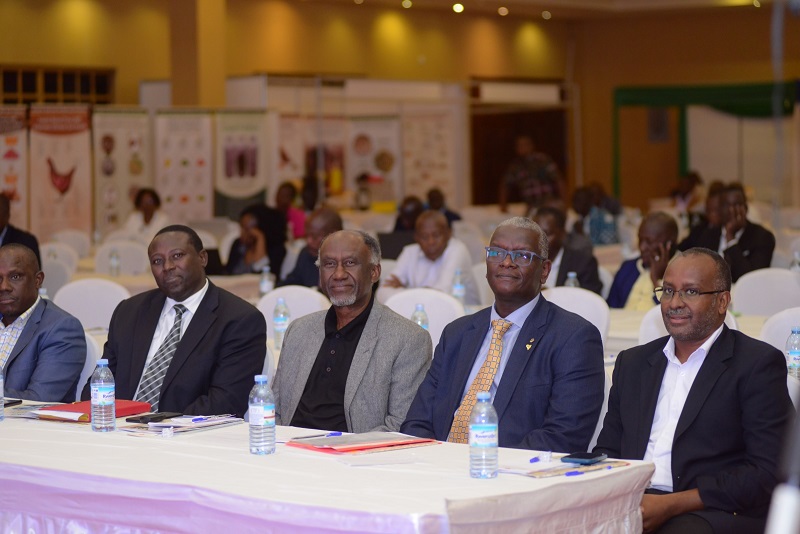
KAMPALA – Uganda is hosting a three-day 10th African Grain Trade Summit at Speke Resort Munyonyo in which players seek among others, to ensure increased grain production, improved quality of production but also improved access to the markets.
The Eastern Africa Grain Council is a member-based organization in 11 countries in Africa that advocates for grain trade and production to make sure there is sufficient food production for humans and animals. This event is held every two years and Uganda hosts it for the second time since inception. Participants included the American Grain Council, European Grain Council, Tanzania, Kenya, Rwanda, Uganda, among others.
Mr. Immanuel Asiimwe – Country Director, Eastern Africa Grain Council told the press at the opening of the summit on Thursday that it brings together the grain sector value chain players to share experiences and discuss the challenges affecting the market, access to finance, technology, and different innovations to be employed to ensure better productivity.
“Our discussions include access to finance to support the production but also the trade of the grains.”
He noted that one of the grain challenges has been aflatoxins – caused by micro toxins which are a form of fungus formed when the grain is not handled properly. Scientists have confirmed that they are extremely dangerous because they cause cancer.
“The only way to manage that is to make sure that grain is properly handled, and dried from the moisture content of about 20 to 13.5 which is recommended for storage,” said Mr. Asiimwe.
On the current agricultural production, he revealed that the Council has established that in the region, it’s only Uganda and Tanzania with a surplus in the food system and the rest have a deficit.
Mr. David Mutazindwa, Council Board Chairman – said that their journey has been both transformative and inspiring but a lot more efforts still needed amidst celebrations.

He noted that Africa still faces challenges of climate change, pests and diseases and global market dynamics which all require vigilance and adaption.
“Over the past decade, Africa has faced unprecedented challenges from weather patterns to locust invasions, and economic hurdles like global pandemic. But in every instance, our grains have demonstrated not just survival but also the capacity for growth and innovation.”
“The council has been at the forefront of promoting structured grain trade – which has meant advocating for a better policy environment, facilitating trade linkages and creating avenues for capacity building,” he added.
Ahead of the next decade, Mr. Mutazindwa called for sustainability and innovation as a necessity.
Mr. Joshua Mutambi – the Commissioner for MSMEs at the Ministry of Trade noted that the main challenge in the sector has been post-handling harvest and losses, which calls for standardized storage facilities.
Also, to mention was inadequate infrastructure and issues with the financing. He added that most of the farmers are smallholder farmers with challenges in mechanized farming with technologies but also facing the challenge of structured markets.
“The government has put in place the policies and initiatives to increase productivity so that we can have sustainable production.”
According to him, Uganda contributes quite a lot, producing around 5 million tonnes of grains annually, maize being the largest. He noted that the country has been consuming around 2.3 million tonnes and the balance left for export until the new policy to add value was recently initiated.
Mr. Gerald Masila – Council Executive Director said that they have committed among others, self-regulation as industry to safeguard food safety, adoption of climate-smart practices to increase adaption to climate change, and consideration of circular business models to reduce food loss and Waste (FLW).
They also committed to making aflatoxin testing and control a responsibility of all stakeholders to reach the last mile, sensitizing consumers on their role in driving the adoption of standards and engaging border on the delays of border processing.
 Other commitments include;
Other commitments include;
To support the government in the region to develop and implement sound and supportive policies for grain trade,
Government to support climate risks mitigation measures to which the national governments in the region continue to progress the implementation of respective climate change adaptation strategies, and
Financial institutions to package financial services with appropriate technical assistance to grain sector players.
Over the years, Mr. Masila underscored a number of achievements by the council including;
Initiation of the process for establishing ISR by developing a road map that now requires implementation,
Rise in the adoption of circular economy models such as Insect-Based Feeds enterprises,
Engagement with governments and border officials organized by EABC led to easing of requirements for, Covid-19 testing at border points,
Supported policy processes including WRS, Country and regional quality standards,
All government have developed climate adaption plans, and
Financial institutions and service providers still exploring different products.





